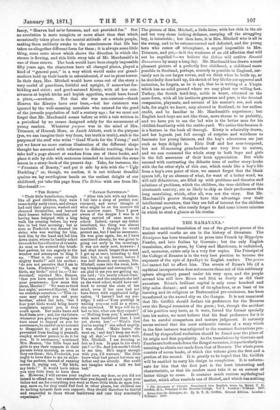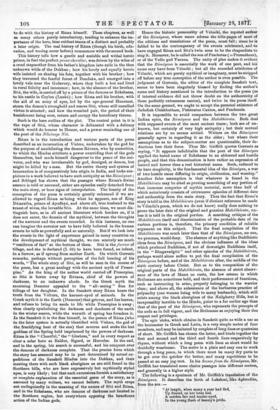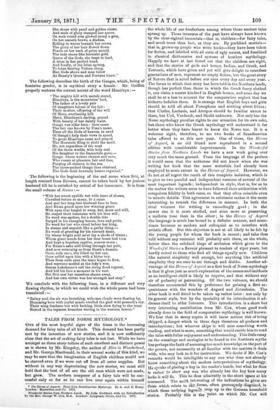THE RAMAYANA.*
Tan first metrical translation of one of the greatest poems of the ancient world marks an era in the history of literature. The Riundyana has been translated in prose into French by Hippolyte Fauche, and into Italian by Gorresio ; but the only English translation, also in prose, by Carey and Marshman, is unfinished, and, moreover, exists only in a very few copies. The Principal of the College of Benare,s is in the very best position to become the exponent of the epic of Ayodhyti to English readers. The genius loci cannot fail to affect him. The events of Rama's life (if a. mythical interpretation does not remove them out of this sublunary sphere altogether) passed under his very eyes, and the people around him still love Rama and Sitii as dearly as did their ancestors. Rlitna's brilliant capital is only some hundred and fifty miles distant ; and much of its splendour, or at least of its learning and its religious or Brahmanical pre-eminence, has been. transferred to the sacred city on the Ganges. It is not unnatural that Mr. Griffith should declare his preference for the Benares- over the Bengal recension of the poem ; but, though the accident- of his position may have, as it were, forced the former specially into his notice, we must believe that his final preference for it is due to careful comparison and mature judgment. It certainly seems natural that the most authentic version of a story which in the first instance was subjected to the constant fluctuations pro- , duced by rhapsodical recitation should be found near the place of its origin and first popularity. As the translations by Gorresio and Fauche are both made from the Bengal recension, it is particularly in- teresting to obtain one made from that of Benares. The whole poem consists of seven books, of which this volume gives the first and a. portionof the second. It is greatly to be hoped that Mr. Griffith will be enabled to carry his design to completion. It is unfortu- nate for him that the first part is the least interesting and. characteristic, so that his readers must take it as an earnest of better things to come. It contains much curious mythological matter, which often reminds one of Hesiod, and which has nothing a The Reimagan of Valmal. Translated into English verse by Ralph T. H. Grifilth, M.A., Principal of the Bemires College. Vol L London : Trilbner. 1870.
Scenes from the Ramayan, Ix. By It. T. H. Griffith. Eocond Edition. London Trlibner. 1870.
-to do with the history of Rama himself. These chapters, as well as many others purely introductory, tending to enhance the im- portance of the hero, bear evident traces of a distinct and probably a later origin. The real history of Rama (though his birth, edu- cation, and wooing occur before) commences with the second book.
This history tells how a gentle and amiable and withal heroic prince, in fact the perfect preux chevalier, was driven by the wiles of a cruel stepmother from his father's kingdom into exile in the then unknown wilds of the Dekkan ; how his lovely and equally heroic wife insisted on sharing his fate, together with his brother ; how they traversed the fearful forest of Dandaka, and emerged into a lovely vale near the Godavery, where they built a hut and lived in rural felicity and innocence ; how, in the absence of the brother, Sita, the wife, is carried off by a prince of the demons or Rakshasas, -to his castle in Ceylon (Lanka) ; how Rama and his brother, with the aid of an army of apes, led by the ape-general Hanumat, storm the demon's stronghold and rescue Sita, whose still unsullied virtue is attested ; and how the reunited pair, the period of their banishment being over, return and occupy the hereditary throne.
Such is the bare outline of the plot. The central point in it is the rape of Sita, whose character is delineated with a delicacy which would do honour to Homer, and a power reminding one of the poet of the Nibelunge Not.
Rama is in the introduction and various parts of the poem described as an incarnation of Vishnu, undertaken by the god for the purpose of annihilating the demon Havana, who by austerities, to which the Hindus attribute a power overriding that of the gods themselves, had made himself dangerous to the peace of the uni- verse, and who was invulnerable by god, demigod, or demon, but might be killed by a man. But the entire theory and system of incarnation is of comparatively late origin in India, and looks sus- picious in a work believed to have such antiquity as the Rciniciyana ; and Schlegel has shown that the passages where Rama's divine essence is told or assumed, either are episodes easily detached from the main story, or bear signs of interpolation. The beauty of the conception of the poem is certainly greatly enhanced if we are allowed to regard Rama as being what he appears, son of King Dasaratha, prince of Ayodhya, and above all, true husband to the truest of wives, the loveable Sitti. At the same time, we must dis- tinguish here, as in all ancient literature which borders on, if it does not enter, the domain of the mythical, between the thoughts of the narrator and the events recorded. In this instance, no one can imagine the narrator not to have fully believed in the human events he tells so powerfully and so naturally. But if we look into the events in the light of experience gained in many countries on the development of mythical thought, we can scarcely see much "residuum of fact" at the bottom of them. Sita is the furrow of tillage, and she is declared (I. 66) to have been found, an infant, in a furrow, as if sprung from mother Earth. On which Gorresio remarks, perhaps without perception of the full bearing of his words, "The whole story of Sita, as will be seen in the course of the poem, has a great analogy with the ancient myth of Proser- pine." As the king of the nether world carried off Proserpine, so Situ is borne away by Minna, chief of the powers of darkness, to an unknown abode. In the Greek myth the mourning Demeter appealed to the " all- seeing " Sun for tidings of her daughter. In the Sanskrit story Rama hears the truth from the Vulture, the keenest-eyed of animals. In the Greek myth it is the Earth (Demeter) that grieves, and lies barren, and refuses to bring its seeds to life while Proserpiue is away ; thus clearly symbolizing the darkness and deadness of the earth in the winter season, while the warmth of spring has forsaken it. In the Sanskrit it is the Sun himself, in the person of Rama (who in the later system is actually identified with Vishnu, the god of the, fructifying heat of the sun) that mourns and seeks the lost goddess of the Spring held imprisoned by the powers of darkness. Rams is the "Cheerful," the "Glorious," and in every respect as clear a solar hero as Baldur, Sigurd, or Hercules. In the end, and in the spring, his search is successful, and his conquest over the demons of darkness complete. That the precise form which the story has assumed may be in part determined by actual ex- peditions of the Sanskrit Hindus into the Dekkan, and their meeting there with such black aborigines as are still found in the Southern hills, who are here expressively but mythically styled apes, is very likely ; but that such excursions furnish a satisfactory or complete explanation of the essential germ of the story, as is assumed by many writers, we cannot believe. The myth crops out undisguisedly in the meaning of the names of Sita and Rama, -and in the Rakshasas, who are demons of darkness not located in the Southern region, but everywhere opposing the beneficent action of the Indian gods.
Hence the historic personality of Valmiki, the reputed author of the Rcinwiyana, whose name adorns the title-pages of most of the editions and translations of the poem, must fall ; since he is fabled to be the contemporary of the events celebrated, and to have engaged Rama and Sita's twin sons to be the rhapsodists to sing it. Moreover, he is called the son of Prachetas (=Prometheus), or of the Vedic god Varuna. The unity of plan makes it evident that the Rciniciyana is essentially the work of one poet, and his' name may have been Valmiki ; but all the recorded attributes of Viihniki, which are purely mythical or imaginary, must be stripped off before any true conception of the author is even possible. The judgment of Gorresio, the editor of the complete Sanskrit text, seems to have been singularly biassed by finding the author's name and history mentioned in the introduction to the poem (as if internal evidence did not throw doubt on the authenticity of these perfectly extraneous cantos), and twice in the poem itself.
On the same ground, we ought to accept the personal existence of Jedediah Cleishbotham, Pisistratus Caxton, and Pendennis.
It is impossible to avoid comparison between the two great Indian epics, the Rdmciyana and the Mahdbhcirata. Both deal with supposed events of the most ancient times ; both are of un- known, but certainly of very high antiquity ; but their mutual relations are by no means settled. Writers on the Rdinciyana generally agree in regarding it as the older ; but where their assumptions as to the subject-matter are questionable, their de- ductions lose their force. Thus Mr. Griffith quotes Gorresio as saying, "It appears indubitable that the poet of the Rcinuiyan applied the hated name of Ibikshasas to an abhorred and hostile people, and that this denomination is here rather an expression of hatred and horror than a real historical name. Such, reduced to its bare simplicity, is the fundamental idea of the Rciniciyan, a war of two hostile races differing in origin, civilization, and worship."
Another false assumption is that whatever is found in the Malicibhdrata may be cited as proving something of any portion of that immense congeries of mythic material, more than half of which notoriously consists of extraneous episodes of different date and authorship from the main story. Thus the fact that Rama's
story is told in the Mahdbhcirala (even if distinct reference be made to Valmiki's poem, which we do not know) really does nothing to prove the later date of the original and genuine Malicibhcirata, un-
less it is told in the original portion. A searching critique of the Mahcibhdrata itself and discrimination of the probable date of its various portions is, therefore, the primary condition of reliable argument on this subject. That the final compilation of the Mahdbhcirata was much later than that of the Rthwiyana, no one, we presume, would deny. The absence of anything like Buddhistic ideas from the kinzdyana, and the obvious influence of the ideas which produced Buddhism, if not of downright Buddhism itself, in the " Bhagavadgita " and other episodes of the Makibluirata, perhaps would alone suffice to put the final compilation of the Rcinuiyana before, and of the Mahdbhdrata after, the middle of the sixth century before Christ. But as to the composition of the original parts of the Mahabhdrata, the absence of strict observ- ance of the laws of Manu on caste, the low esteem in which Brahmans are sometimes held, and their performance of functions, such as instructing in arms, properly belonging to the warrior class ; and above all, the subsistence of the barbarous practice of polyandry (one woman being wife to many husbands), which still exists among the black aborigines of the Neilgherry Hills, but is inexpressibly horrible to the Hindu, point to a far earlier age than that of the poet of the Rcinuiyana, who represents the precepts of the code as in full vigour, and the Brahmans as enjoying their due respect and privileges.
The epic 'sloka, which obtains in Sanskrit quite as wide a use as the hexameter in Greek and Latin, is a very simple metre of four members, and may be imitated by couplets of long lines or quatrains
of short. Mr. Griffith has chosen the latter, and binds together the first and second and the third and fourth lines respectively by rhyme, without which a long poem with lines so short would be decidedly wearisome. The metre is a plain and easy one to work
through a long poem, in which there must be many dry parts to be got over the quicker the better, and many repetitions to be passed at an easy jog-trot. In his Scenes front the Rcinadyana, Mr.
Griffith has translated some choice passages into different metres, and generally in a higher style.
The following is a specimen of Mr. Griffith's translation of the Rdmdyana. It describes the birth of Lakshmi, like Aphrodite, from the sea :—
"At length, when many a year had fled, "Up floated, on her lotus bed,
A maiden fair and tender-eyed,
In the young flush of beauty's pride.
She shone with pearl and golden sheen, And seals of glory stamped her queen. On each round arm glowed many a gem, On her smooth brows, a diadem. Rolling in waves beneath her crown The glory of her hair flowed down. Pearls on her neck of price untold, The lady shone like burnisbt gold. Queen of the Gods, she leapt to laud, A lotus in her perfect hand, And fondly, of the lotus sprung, To lotus-bearing Vishnu clung. Her, Gods above and men below As Beauty's Queen and Fortune know."
The following describes the birth of the Ganges, which, being of feminine gender, is in mythical story a female. Mr. Griffith properly restores the correct accent of the word Himilkya
:- "The mighty hill with metals stored,
Himalaya, is the mountains' lord, The father of a lovely pair Of daughters fairest of the fair: Their mother, offspring of the will Of Meru, everlasting hill, Mend, Himalayan darling, graced With beauty of her dainty waist.
Gauga was elder born: then came The fair one known by Uma's name.
Then all the Gods of heaven, in need Of Gangtt's help their vows to speed, To great Himalaya came and prayed The Mountain King to yield the maid.
He, not regardless of the weal Of the three worlds, with holy zeal His daughter to the Immortals gave,— Ganga whose waters cleanse and save, Who roams at pleasure, fair and free, Purging all sinners, to the sea.
The three-pathed Ganga thus obtained, The Gods their heavenly homes regained.'
The following is the beginning of the sad scene when &tit, at length rescued from Ravana, cannot be taken back by her jealous husband till he is satisfied by ordeal of her innocence. It is from the small volume of Scenes
With her sweet eyelids wet with tears of shame, Unveiled before so many, Si a came And met her long-lost husband face to face.
And Rama gazed upon her winning grace With eyes that longed to weep, but, mute and still, He stayed their fountains with his iron will ; No word was spoken, for a double tide Surged in his changing bosom, love and pride.
No word for her who stood before her king,
In shame and anguish like a guilty thing,—
No word of greeting for his rescued dame, On whose bright soul ne'er lay a shade of blame ; Whom giant hands from her dear home had torn And kept a hopeless captive, Borrow-worn; For RAMA'S sake still living through her pain, And now returning as from Death's domain.
Once, only once, she lifted up her eye, Once called upon him with a bitter cry.
Then from rude eyes the tears began to flow, And warriors melted at the lady's woe.
Seam Lakshman's self the rising flood represt, And hid his face a moment in his vest.
But Sita cast her causeless shame away, And her own virtue was her strength and stay."
We conclude with the following lines, in a different and very lowing rhythm, in which we could wish the whole poem had been translated :—
" Balmy cool the air was breathing, welcome clouds were floating by, Humming bees with joyful music swelled the glad wild peacock's cry. Their wing .feathers wet with bathing, birds slow flying to the trees Rested in the topmost branches waving to the western breeze."




































 Previous page
Previous page